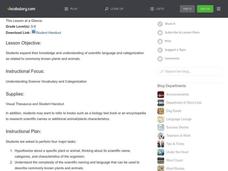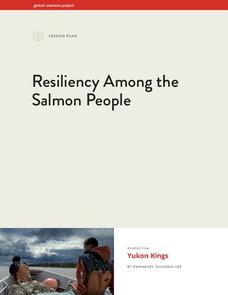Howard Hughes Medical Institute
Got Lactase? The Co-Evolution of Genes and Culture
Does the human body evolve as quickly as human culture? With a stellar 15-minute video, explore the trait of lactose intolerance. Only about 1/3 of human adults seem to still have the enzyme lactase and therefore, the ability to digest...
LABScI
Harmonic Motion: Pendulum Lab
Several times throughout history, groups of soldiers marching in rhythm across a suspension bridge have caused it to collapse. Scholars experiment with pendulums, resonance, and force to determine why this would happen. First, pupils...
Curated OER
Who Took Jerell's iPod? ~ An Organic Compound Mystery
Within the setting of a crime scene investigation, biochemistry beginners analyze organic compounds as a means of determining "Who dunnit." They use a brown paper test for lipids, glucose test strips and iodine to identify carbohydrates,...
Curated OER
In Katrina's Wake
You will need to go to the National Center for Biotechnology Information website to obtain the article, "In Katrina's Wake." Have your class read it and examine maps of where toxic chemicals were located in Louisiana at the time,...
Curated OER
A Yen for Maximum Residue Limits in Food
Future public health officials or agriculturists read an article and answer questions concerning the Japanese regulations for pesticide exposure. They compare the maximum residue limit for two, 4-D of Japan with other countries. This is...
Curated OER
The Science of Respiration and Blood Circulation
Fifth graders study how respiration and circulation are connected. In this respiratory lesson students complete several activities to better understand heart rate and carbon dioxide in the body.
Curated OER
Teaching Controversial Science Issues Through Law Related Education
A set of lessons help aspiring scientists practice the critical thinking skills required for facing controversial issues such as evolution. As a group, they discuss what controversy consists of. They compare and constrast the concepts of...
Curated OER
Oceans in Motion
This simple lesson introduces children to basic marine life as well as to show them the necessity of protecting aquatic environments. Some famous marine life animals are introduced via vocabulary words, then children cut out pictures of...
Curated OER
Biodiversity Debate - Stream Side Science
Role play community members who are both for and against the construction of a dam. Research the pros and cons and then hold a classroom debate. This activity ideally follows a series of stream studies, links to which are included. Use...
Learning for Life
Lesson 7: Stimulants
Make sure your class is aware and informed of the various types of stimulant drugs that exist. Here, they can learn their alternate names and some of their harmful effects. While this is a very basic direct-instructional instructional...
Curated OER
Survival Lesson Plan
Students participate in a survival lesson that teaches four steps to take in the event of dealing with an emergency. The skill of improvising is practiced and its importance is stressed as being resourceful. Students also cover the...
Serendip
How Mistakes in Cell Division Can Result in down Syndrome and Miscarriages
Some genetic conditions occur without being inherited. The distinction becomes the focus of the lesson. It details the process of cell division that results in trisomy on various chromosomes. A worksheet highlights the results including...
Curated OER
LESSON #2 SAFETY UNIT: Real-life reading selection
When studying pollution and the environment, you can use this activity as an enrichment. Safety-conscious learners read a 2005 article about an ammonia leak from a Kentucky fast-food product plant. They work in small groups to discuss...
Curated OER
Understanding Science Vocabulary and Categorization
Students analyze scientific vocabulary words. In this life science vocabulary lesson, students complete a worksheet using VisualThesaurus as they evaluate words related to plants and animals and how the words are used.
NOAA
Ocean Acidification
If tap water is more acidic than ocean water, why are we so concerned about ocean acidification? The third installment of a 23-part NOAA Enrichment in Marine sciences and Oceanography (NEMO) program focuses on carbon dioxide levels in...
NOAA
Invertebrates
Crabs and lobsters ... yum! The 18th installment of a 23-part NOAA Enrichment in Marine sciences and Oceanography (NEMO) program focuses on invertebrate marine life. After the lecture slideshow, learners conduct an activity to sample...
NOAA
Vertebrates I
I spy a spine. The 19th installment of a 23-part NOAA Enrichment in Marine sciences and Oceanography (NEMO) program explores vertebrate species, such as sharks and other fish. Learners take part in an activity evaluating the...
Institute of Electrical and Electronics Engineers
Working with Wind Energy
Teams design and build a windmill, under budget, that can lift an object. The groups evaluate and reflect on their own design, then on those produced by other teams. The goal is to determine which design is the most...
NOAA
Ocean Exploration
Where am I? The second installment of a 23-part NOAA Enrichment in Marine sciences and Oceanography (NEMO) program starts with pupils guessing the years in which major ocean exploration events took place. The lesson then focuses on how...
NOAA
Technology II
Ping, ping, ping. The last installment of a 23-part NOAA Enrichment in Marine sciences and Oceanography (NEMO) program explores technology use in marine studies, such as sonar. Activity involves simulating sonar techniques to identify a...
Global Oneness Project
Resiliency Among the Salmon People
Is losing cultural traditions the cost of social progress, or should people make stronger efforts to preserve these traditions? High schoolers watch a short film about the native Yup'ik people in Alaska and how they handle the shifts in...
Messenger Education
Mission: Possible—How Can We Plan an Exploration of Another World?
An astronaut's spacesuit weighs 280 pounds and takes 45 minutes to put on — that's a serious suit! The second activity of a three-part series allows pupils to see all that goes into space exploration. Through simulations, groups analyze...
Messenger Education
Exploring Exploring
The reason people first began trading was because of their desires for objects other societies possessed. In the activity, classes discuss why exploration has been a common thread in all societies and where these desires have taken...
Teach Engineering
Solving Energy Problems
Here's your chance to save the world. The eighth lesson in a 25-part Energy Systems and Solutions unit has young scientists come up with ideas for individual or group projects. They identify ways to solve the energy crisis. Hope they...























